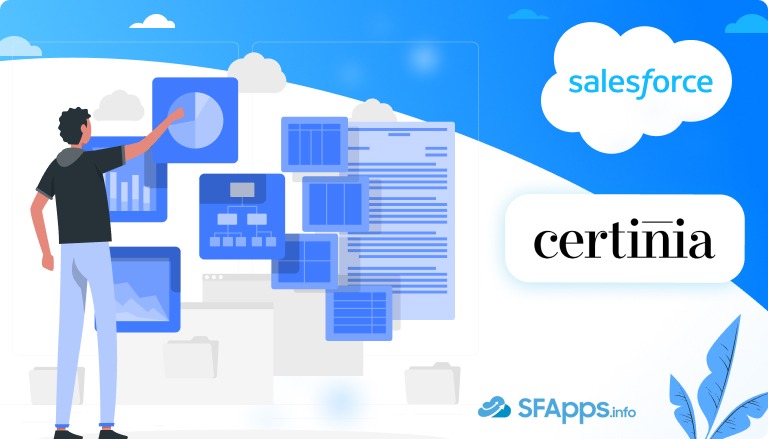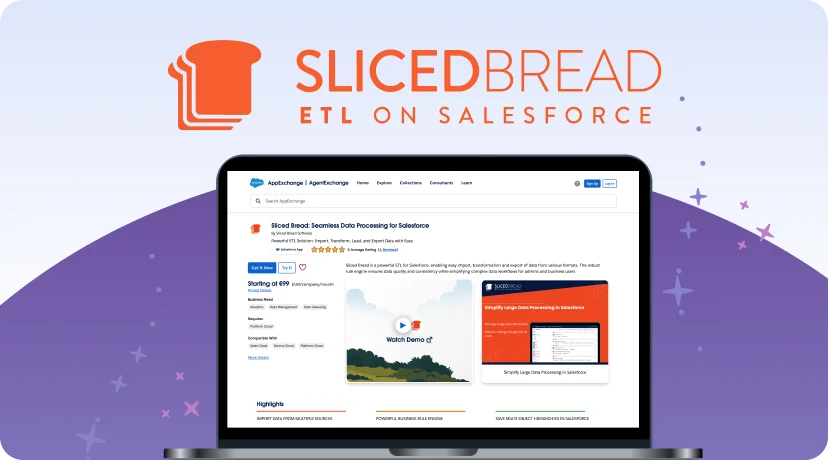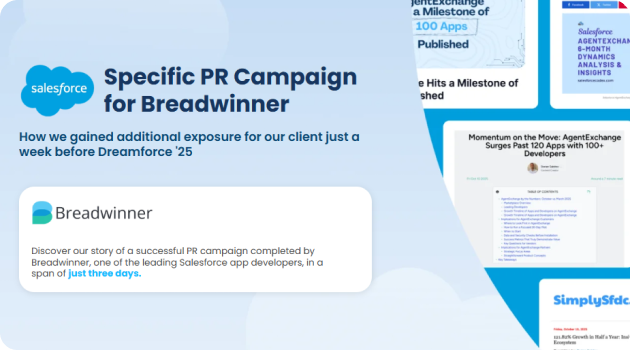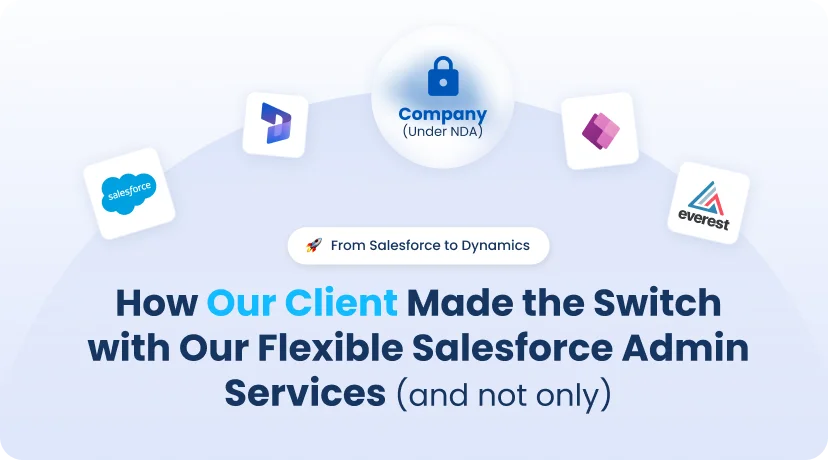
Certinia (formerly FinancialForce) is a higher-end enterprise resource planning (ERP) software natively built on Salesforce. It provides integrated financial management, professional services automation (PSA), billing, and revenue recognition solutions on the Salesforce platform.
What distinguishes Certinia is its orientation toward project-based and services businesses. The company rebranded from FinancialForce to Certinia in May 2023 to signal its evolution into a unified SaaB platform for services industries. Its close integration with Salesforce and modular architecture make it an excellent option for fast-moving companies.
The demand for hiring FinancialForce ERP developers has grown steadily alongside the platform’s AI-enabled capabilities. In its Spring 2024 release, Certinia introduced AI-driven tools for project scoping, cash flow forecasting, and resource optimization directly in PS Cloud. These innovations highlight why Salesforce-native ERP specialists are in high demand.
According to Gartner Peer Insights, Certinia ERP Cloud holds a 4.0 out of 5.0 rating based on 102 verified user reviews. Users have praised its modular architecture and scalability, making it a strong choice for service-centric enterprises.
Choosing the right developer: freelance, in-house, remote, or offshore, is critical. In this guide, you’ll discover when to hire one, what your investment might look like, how to source exceptional talent, and how to ensure they align with your business requirements. For businesses seeking both cost efficiency and access to global expertise, one effective option is to hire FinancialForce ERP developer offshore.
- When Do You Need a Certinia ERP Developer?
- Where to Look for the Ideal Certinia ERP Developer
- In-House vs. Offshore vs. Freelance: Evaluating Hiring Models
- How Much Does It Cost to Hire a Certinia ERP Developer?
- How to Evaluate & Interview Certinia ERP Developer Candidates
- Interview Questions to Ask
- FAQ
- 1. Who is a Certinia ERP Developer?
- 2. What is the difference between an ERP admin and a Certinia ERP developer?
- 3. Why hire a specialist Certinia developer rather than a general Salesforce developer?
- 4. What is the onboarding time for an offshore or remote Certinia developer?
- 5. What skills should a FinancialForce developer for hire have?
- 6. Is offshore hiring of Certinia developers reliable?
- 7. How do I ensure quality when hire FinancialForce ERP developer remote?
- Conclusion
When Do You Need a Certinia ERP Developer?
You need to bring in a Certinia ERP developer when your business outgrows the pre-configured features of the platform and requires custom solutions for a certain business process. These developers, especially those who’ve developed Salesforce-native applications, have the requisite experience to install, customize, and configure ERP functionality for your particular business operations needs. Partnering with experts in Financialforce ERP services ensures that your system is tailored to scale efficiently with your business growth.
Typical Scenarios Demanding a Certinia Developer
- Early ERP Configuration: Configuring Certinia modules for financials, billing, or PSA as part of onboarding brings expertise in mapping platform functionality to your business model.
- A developer is required if you want to automate multi-step processes, connect financial data to CRM records, or create dashboards reflecting real-time performance.
- Third-Party Tool Integration: Integration of third-party tools (e.g., payroll, procurement software, HR systems) with Certinia involves API-level integration and testing – an developer ensures hassle-free data flow.
- System Upgrades and Scalability: As your business grows, you will need someone to fine-tune existing configurations, introduce new functionality, or port legacy ERP functionality to Certinia.
- Regulatory and Financial Compliance: Configuring the ERP system to comply with local accounting principles or industry-specific regulations is a job for an experienced developer.
In summary, unless your organization has in-house Certinia or Salesforce experience, or business activities are not too complicated for plain-vanilla templates, employ FinancialForce ERP developers.
Where to Look for the Ideal Certinia ERP Developer
It is simple to advise to find a good Certinia (FinancialForce) ERP developer, but it isn’t an issue of searching – you require experts with solid Salesforce platform skills, ERP customization experience, and preferably, domain expertise in finance, services, or operations. The following are the best sources to seek out such experts:
1. Salesforce-Certified Consulting Partners
The majority of Salesforce consulting firms specialize in Certinia solutions and have pre-screened ERP developers. The companies offer scalable teams, implementation support, and ongoing maintenance. SFApps, for example, is a top provider that helps businesses recruit FinancialForce ERP developers remotely or offshore, based on business needs.
2. Freelance Platforms with Salesforce Experts
Toptal, Upwork, and Codementor marketplaces will list Certinia-experienced developers for hire. It’s a budget-friendly option, yet compliance, onboarding, and quality are your responsibility. It’s a more suitable fit for a short-term need or MVP-style integrations.
3. LinkedIn and Salesforce Talent Marketplaces
Using LinkedIn search filters or Salesforce’s internal talent pool (i.e., AppExchange partners or Trailblazer Community) simplifies finding developers with the desired Certinia skill set. Look for individuals with experience in implementing ERP projects such as billing, PSA, and accounting automation. For companies seeking flexibility and cost efficiency, LinkedIn also makes it easier to hire FinancialForce developer offshore, ensuring access to global Salesforce-certified talent.
4. Offshore Development Agencies
In case you prefer to hire remote Salesforce developers offshore, organizations in Eastern Europe, India, or Southeast Asia possess proficient specialists at more affordable rates. This model suits businesses focused on cost reduction and prepared for remote collaboration.
Insight: Hiring through a certified partner ensures ERP subject matter expertise as well as legal compliance. This model reduces the risk of project delay, non-compliance, or misalignment with company processes.
You can oversee the developer yourself or offshore onboarding, project management, and performance monitoring to the provider – a necessity if you offshore or hire FinancialForce developer offsite.
In-House vs. Offshore vs. Freelance: Evaluating Hiring Models
Your hiring model can yield immense returns in cost, efficiency, and scalability when it pertains to how to hire Certinia (FinancialForce) ERP developers. Let’s pit the three principal models against each other: in-house, offshore, and freelance.
| Type | Advantages | Cons | When to Use |
| In-House Developers | – Full ownership of development process- Cultural fit with company- Easier internal coordination | – Higher costs (salaries, benefits, taxes)- Longer hiring and onboarding- Less flexible if project needs change | Ideal for firms with multi-year ERP strategies or highly sensitive data requiring on-premise maintenance |
| Offshore Teams | – Cost savings with access to specialized expertise- Scalable for large or repetitive projects- Time zone flexibility for 24/7 operations | – Communication challenges if not managed- Depends on stable partner for quality and security | Best for offsite or offshore ERP development with stable workloads and project-based delivery; cost-effective for mid-size and enterprise clients |
| Freelancers | – Quick onboarding- Suitable for patches or one-off tasks- Lower short-term costs | – Risk of inconsistent delivery- No long-term support- May miss overall system perspective | Suitable for small, short-term tasks or one-off fixes |
Pro Tip: Leveraging remote FinancialForce ERP developers offshore can maximize both speed and expertise for implementation and post-launch support.
Insight:
When deciding how to hire Certinia (FinancialForce) developer, the model you choose affects cost, efficiency, and project success. In-house teams give full control and cultural alignment but are expensive and slower to scale. Freelancers are quick and cheap but lack long-term support. Offshore teams strike a balance – offering skilled developers, flexibility, and cost efficiency.
How Much Does It Cost to Hire a Certinia ERP Developer?
Hiring a Certinia (FinancialForce) ERP developer can be variably costly depending on the model of hiring, seniority of the developer, and geographical location. What follows is an estimation of the cost of each hiring model. For organizations balancing budget and flexibility, a common approach is to hire FinancialForce ERP developer remote, gaining access to skilled talent without the overhead of on-site employment.
1. In-House Hiring Costs
In the case that you hire FinancialForce ERP admin offsite, you would pay:
- USA/UK/EU: $90,000-$140,000/year for mid-senior grade ERP developers
- Junior new hires: $60,000-$85,000/year
- Other expenses: Payroll tax, insurance, benefits, and retention bonuses add 20%-40% to base salary
- Insight: Control and retention in the long term are possible through in-house hiring at high expense.
2. Offshore and Remote Hiring Costs
Hiring FinancialForce ERP developer offshore is highly cost-effective:
- Eastern Europe, LATAM, Asia: $35-$60/hour
- Offshore full-time contracts: $3,500-$8,000/month depending on skills and time zone overlap
- Best deal: Offshore hire Financialforce developer remote from trusted vendors with vetting, compliance, and SLA assurance
3. Freelance Engagement Rates
For assignment- or task-based ad hoc contracts:
- Freelance ERP specialists: $40-$90/hour
- Fixed projects: Vary from $2,000 to $15,000 based on complexity level
This is perfect if you are an offsite contracting FinancialForce developer for report development or system customization without making a long-term commitment.
How to Evaluate & Interview Certinia ERP Developer Candidates
Finding a good Certinia (FinancialForce) ERP developer is just the starting point. To guarantee a great fit for your business needs, your interviewing and evaluation process should be structured and based on business and technical competencies. In many cases, companies also choose to hire FinancialForce ERP admin offshore to handle ongoing system administration alongside developers, ensuring both customization and day-to-day operations are managed effectively.
Key Evaluation Factors
Evaluation of ERP developer prospects should start with the examination of the following:
- Platform Experience
- Ensure the candidate possesses practical experience in implementing Certinia ERP modules like PSA, FFA, Billing Central, or SCM. Ask for examples of previous implementation or customization.
Salesforce Ecosystem Knowledge
Since Certinia is developed on top of Salesforce, developers ought to be able to demonstrate proficiency in Apex, Visualforce, LWC, as well as data model integrations on the Salesforce Platform.
Process Understanding
Leading ERP innovators possess background experience in business processes such as order-to-cash, revenue recognition, or professional services workflows. Look for domain expertise in your industry.
Customization & Integration Experience
Ask about previous API integration with third-party CRMs, billing systems, or accounting systems. Evaluate their experience in working with REST/SOAP APIs, middleware, or integration platforms such as MuleSoft.
Soft Skills & Communication
Excellent communication skills are particularly useful for offshore or remote roles. Are they able to explain ERP processes to non-technical stakeholders?
Interview Questions to Ask
- What FinancialForce modules have you implemented?
- How would you manage a non-native customization request in Certinia?
- Can you explain a difficult Salesforce-Certinia integration you’ve done?
- How do you ensure data consistency between ERP and CRM systems?
- How do you stay current with Salesforce and Certinia release features?
FAQ
1. Who is a Certinia ERP Developer?
A Certinia (FinancialForce) ERP developer builds and optimizes ERP solutions on Salesforce. They handle coding, workflow automation, third-party integration, and financial/project modules. Hiring one ensures efficient processes aligned with business goals.
2. What is the difference between an ERP admin and a Certinia ERP developer?
Developers manage backend tasks: coding, modules, and integrations. Admins handle day-to-day operations like user support, permissions, and reporting. Many companies choose to hire FinancialForce ERP admin remote for ongoing support while relying on developers for deeper customization. Combining both roles ensures smooth operation and effective system tailoring.
3. Why hire a specialist Certinia developer rather than a general Salesforce developer?
Certinia uses ERP-focused modules like Financial Management, PSA, and SCM. Specialists understand accounting, billing cycles, and reports, reducing errors and ensuring smooth implementation. Businesses often hire FinancialForce ERP developer offsite for flexible project-based delivery with cost efficiency.
4. What is the onboarding time for an offshore or remote Certinia developer?
Through an agency, offshore developers can start in 2–4 days. Internal hiring may take 4–8 weeks. Offshore/remote hiring provides faster access to talent at lower costs, especially with an EOR for compliance.
5. What skills should a FinancialForce developer for hire have?
3–5 years’ experience with Certinia, Salesforce Platform Developer I/II certification, and skills in Apex, SOQL, and Lightning. Knowledge of PSA, FinancialForce Accounting, and SCM is essential; Agile, sandbox, and Git experience is a plus.
6. Is offshore hiring of Certinia developers reliable?
Yes, with the right partner. Offshore developers are skilled and certified. Verify vendors, check case studies, and consider trial periods. Using an EOR ensures legal compliance and reduces hiring risk.
7. How do I ensure quality when hire FinancialForce ERP developer remote?
Define scope, deliverables, and skills. Use structured interviews, tests, and case studies. Trial engagements and EOR support reduce risk and manage compliance.
Conclusion
Hiring a Certinia (FinancialForce) ERP developer is not just about filling a technical role – it is about ensuring that your business operations, financial processes, and service delivery are fully aligned with a rapidly evolving Salesforce-native ERP platform. Whether you choose in-house, offshore, or freelance developers, the right decision depends on your project scope, budget, and long-term ERP strategy.
By evaluating candidates on both technical expertise and business process knowledge, you set your organization up for smooth implementations, efficient customizations, and scalable growth.
Key takeaway: If your company is serious about optimizing workflows, integrating third-party systems, or maintaining compliance, a specialized Certinia ERP developer is an investment in long-term efficiency and resilience.

Svitlana is a Communications Manager with extensive experience in outreach and content strategy. She has developed a strong ability to create high-quality, engaging materials that inform and connect professionals. Her expertise lies in creating content that drives engagement and strengthens brand presence within the Salesforce ecosystem. What started as a deep interest in Salesforce later transformed into a passion at SFApps.info where she uses her skills to provide valuable insights to the community. At SFApps.info, she manages communications, ensuring the platform remains a go-to source for industry updates, expert perspectives, and career opportunities. Always full of ideas, she looks for new ways to engage the audience and create valuable connections.






 Previous Post
Previous Post Next Post
Next Post